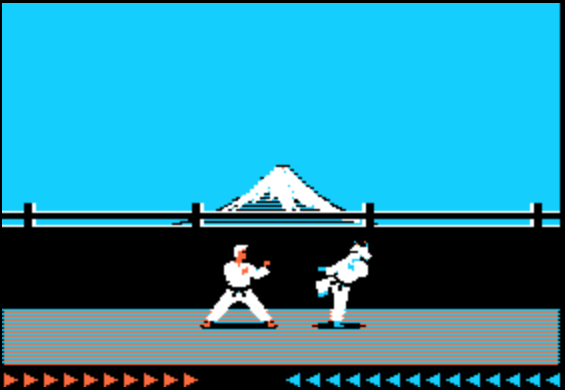
Why are you kicking? You are half a leg's length away! What are you doing?
I'm on a adventure of determinate length and a blue ninja is running at me. The camera cinematically cuts between him, sprinting in my direction, and me, doing a cautious sideways ninja creep because I don’t know any other way of moving. I kick at him vigorously, or more truthfully, I swing one leg around in the air until he runs into it enough times that he eventually dies. I hardly creep another inch before an identical enemy ninja comes running my way again.
This is the world of Karateka, a 1984 beat ‘em up game. It's an early work of Jordan Mechner, who went on to create the Prince of Persia series. I’m able to play Karateka today because it has been preserved along with a number of other games at the Internet Archive historical software page, both for download and in a browser emulator of limited integrity.
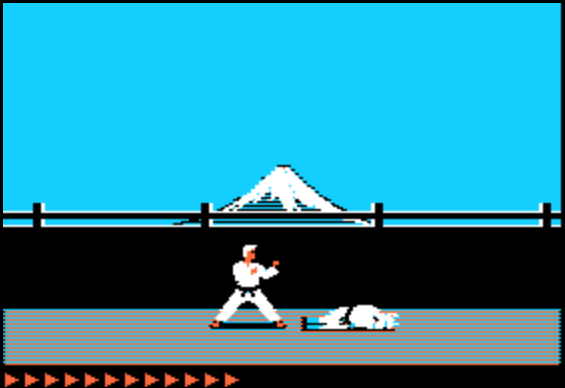
Killed him dead!
I never played the original Karateka—it came before my time. I was born in 1987, and the earliest game I remember playing was Treasure Mountain! (released in 1990). Even if that game was restricted to arcane keyboard controls, it was also aimed at children. Real old school games, especially the arcane RPGs and fighting games, have more or less remained off my radar.
My older Ars peers tell me that Karateka is a short game. It’s also a game without any breaks or even a pause button, though this could just be a function of my poorly mapped keyboard. The enemy martial arts experts just keep coming, even when I am kicking at them. The AI dumbly strides forward at me while my foot flaps around in the air, as if to say, "I am computationally obligated to approach you and fall on the sword that is your leg."
I lay out ninja after ninja by spamming kicks (pressing every key on my keyboard failed to yield a punch button), but per the one inviolable beginner’s rule of fighting games, the second I start to try to be strategic about my attacks, I lose. My avatar crumples to the ground in a blob of huge white pixels. Game over. Start from the beginning.
The Internet Archive’s stash presents an opportunity for me to play these vintage games that I might not otherwise have even run across. I had never heard of Karateka or most of the games of the top-five list of downloads before, and I would probably never have thought to seek out classics of the Apple IIc gaming era. The Internet Archive is a path to both highlighting and providing these games, even if it’s operated without the original game publishers’ explicit blessings.
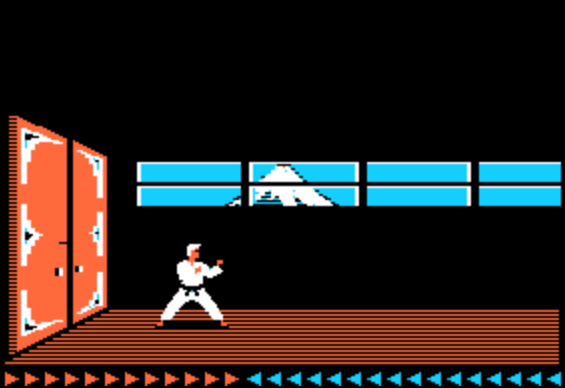
The second "level" of Karateka, which is identical to the first level, except you're apparently indoors.
Everything on the Internet Archive, which includes software and games as well as movies and video content, stays there under the fair use provision in US copyright law. The Internet Archive places a lot of emphasis on the idea that the emulations and downloads are distributed for non-commercial use with attribution, and the service is maintained through donations.
Video game ROMs exist at the margins of legality at best. Most big video game companies outright condemn them and (rightfully, in many cases) classify them as copyright infringement. But existence or temporary hosting of a ROM is different from committed preservation of one under fair use, which software hasn’t seen a whole lot of. That the games can now be emulated in-browser will go a long way to keep them alive and in the public consciousness.
Brewster Kahle, founder and digital librarian of archive.org, did not respond directly to requests for comment on this matter. There is still a version of Karateka for sale, though not emulated on the Apple IIc platform: it's been ported to iOS, and creator Jordan Mechner also released a remake on the App Store in 2012.
Video games have found precious few sanctuaries in libraries or archives, and collections at major museums are usually modestly sized (notable exceptions are the National Museum of Play and ICHEGin Rochester, NY). In the last two years, the Museum of Modern Art and the Smithsonian both created collections involving the usual suspects of notable video games: Pac Man, Super Mario Bros, Myst, SimCity.
But these collections are far from comprehensive, and online gaming history can go way beyond this surface. Any Web-surfing gaming archaeologist can find landmark software like the Internet Archive’s Visicalc and WordStar or fan-made emulators of Windows 1.0 or 3.1 dredged up from the annals of computer history. Their existence on the Internet makes that experience far more accessible to those who might never have tried these programs or operating systems.
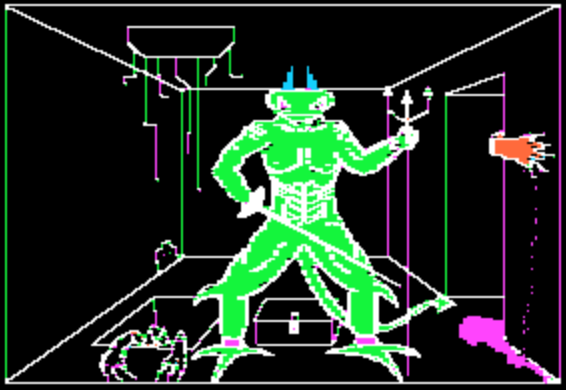
I don't... know, but it's in the intro scene of Akalabeth.
While experimenting with these old games, I also tried my hand at Akalabeth, one of the earliest video-game RPGs and a precursor to the Ultima series. It takes place in a poorly drawn world that operates as if it was conceived by a drunken, excitable child. The art is strangely reminiscent ofHyperbole and a Half or cave paintings.
The emulation isn’t helped by the fact that it seems to not only misunderstand my keyboard’s layout but that keys appear to get remapped every few presses. Even so, the instructions are so extensive and arcane it’s amazing that anyone could be bothered to commit them to memory. I screenshotted them, but in the dark days, people presumably wrote them down.
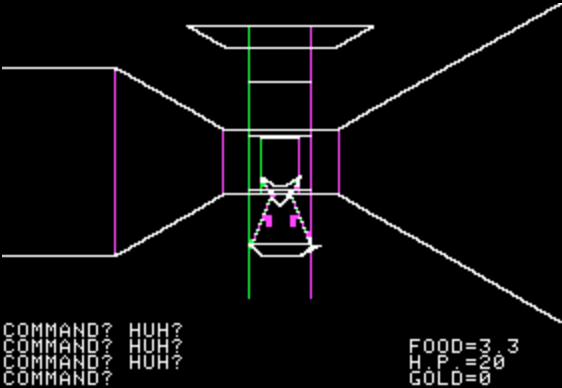
A giant rat that is unusually strong and impervious to large, sharp weapons.
I concede that modern games are staged so that almost all main characters are irrationally immortal and generally not constrained by our understandings of time and space—instead of dying or starting again, you faint, respawn, or regenerate. But Akalabeth is just too real. You can’t accomplish much without facing death. If you spend too much time exploring outside, you run out of food and die. You can’t hit a rat with your axe or rapier, so you die. If you're in a dungeon too long, you die.
Players of these games would have to be masochistic. There is a seemingly endless number of ways that you can not only die but be compelled to start over from the beginning, set up yet another character, buy another set of weapons, and try to navigate between mountains just a little better this time so you have a slightly better chance of not dying at the hand of a giant, pentagonal rat.
I can’t argue against choosing to preserve Tetris or the immortal and impenetrable Dwarf Fortressover this Karateka that Ars deputy editor Nate Anderson gets so enthusiastic about. But computer games and software deserve more dedicated preservation space, if only to highlight how patient and credulous we were (or had to be) then and how angry and impatient we are now.

0 comments:
Post a Comment